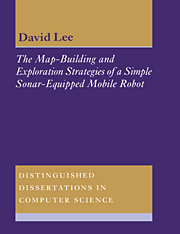 The Map-Building and Exploration Strategies of a Simple Sonar-Equipped Mobile Robot
The Map-Building and Exploration Strategies of a Simple Sonar-Equipped Mobile Robot Book contents
- Frontmatter
- Contents
- Preface
- 1 Question, Context and Method
- I Starting Points
- II System Components
- III Experiments
- 11 Experimental Evaluation
- 12 Wall-Following
- 13 The Results of Localisation
- 14 Supervised Wall-Following
- 15 Can a Human Do Any Better?
- 16 Longest Lines of Sight
- 17 Free Space Boundaries
- 18 Summary of Experimental Results
- 19 Conclusions
- 20 Directions for Further Research
- Appendix A The Feature-Map Data Structure
- Appendix B Test Rooms
- Appendix C Finding the Best-Fit Line
- Appendix D ARNE's Standard Dialogue
- Bibliography
- Index
18 - Summary of Experimental Results
Published online by Cambridge University Press: 05 March 2012
- Frontmatter
- Contents
- Preface
- 1 Question, Context and Method
- I Starting Points
- II System Components
- III Experiments
- 11 Experimental Evaluation
- 12 Wall-Following
- 13 The Results of Localisation
- 14 Supervised Wall-Following
- 15 Can a Human Do Any Better?
- 16 Longest Lines of Sight
- 17 Free Space Boundaries
- 18 Summary of Experimental Results
- 19 Conclusions
- 20 Directions for Further Research
- Appendix A The Feature-Map Data Structure
- Appendix B Test Rooms
- Appendix C Finding the Best-Fit Line
- Appendix D ARNE's Standard Dialogue
- Bibliography
- Index
Summary
This chapter summarises the results of the experiments that were reported in Part III of this thesis.
Section 18.1 examines the performance of the sensor model by analysing the results of the wall-following explorations that were presented in Chapter 13. Section 18.2 uses the same experimental data to consider the effectiveness of the feature-based map-building algorithm.
Chapters 12 to 17 described a variety of exploration strategies and presented the results of experiments to evaluate those strategies. Section 18.3 collects those experimental results together in order to compare all of the autonomous strategies across the set of test environments.
Section 6.3 introduced a sensor model in which adjacent sonar returns of similar range were grouped into ‘readings’ to decrease the uncertainty caused by the width and uneven strength of the sonar beam. Table 18.1 shows the number of readings of each size that were taken during the wall-following explorations of the three main test environments. It can be seen that approximately 20% of the readings contained two or more returns. Expressed in terms of the raw returns instead of the readings, the results show that 37.5% of the returns were included into groups of size two or more. (Maximum-range returns are excluded from the grouping process and from this calculation.) This supports the opportunistic nature of this approach, grouping the returns where possible but using all of the available information. An insistence that groups contain at least two returns would have eliminated almost two-thirds of the returns.
Information
- Type
- Chapter
- Information
- The Map-Building and Exploration Strategies of a Simple Sonar-Equipped Mobile RobotAn Experimental, Quantitative Evaluation, pp. 187 - 196Publisher: Cambridge University PressPrint publication year: 1996